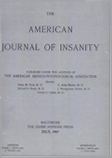SCHIZOPHRENIC TRAITS IN THE FUNCTIONAL PSYCHOSES AND IN NORMAL INDIVIDUALS
Abstract
A questionnaire consisting of 50 typical schizophrenic behavior traits, as determined by a consensus of psychiatric opinion, was given to 100 manic-depressives, 125 schizophrenics, and 240 normal individuals. From the data collected, the following conclusions are offered:
1. The normal and schizophrenic groups possess on the average about the same number of schizophrenic traits. The former report 18 such traits and the latter 17.60 traits. The manic-depressive group, on the other hand, report only 14 such traits or about 80 per cent as many as the other two groups.
2. Analysis of individual traits fails to reveal a dichotomy of personality types underlying schizophrenic and manic-depressive patients. There is some indication that normal individuals possess somewhat different traits than psychotic individuals, but in general, all groups tend to have the same personality traits.
3. The lack of agreement between clinical observers of personality types and experimental workers is perhaps due to the fact that the former have interpreted personality as an organized whole or a gestalt, whereas the latter have interpreted personality as a sum of traits.
4. This analysis, by means of the questionnaire method, of the hypothesis that the "total personality" is basic in the development of the disease syndrome, indicates that either the questionnaire method is not a valid way to check the hypothesis or that the hypothesis is incorrect. Further work is under way which may determine more satisfactorily the validity of the concept of the total personality.
Access content
To read the fulltext, please use one of the options below to sign in or purchase access.- Personal login
- Institutional Login
- Sign in via OpenAthens
- Register for access
-
Please login/register if you wish to pair your device and check access availability.
Not a subscriber?
PsychiatryOnline subscription options offer access to the DSM-5 library, books, journals, CME, and patient resources. This all-in-one virtual library provides psychiatrists and mental health professionals with key resources for diagnosis, treatment, research, and professional development.
Need more help? PsychiatryOnline Customer Service may be reached by emailing [email protected] or by calling 800-368-5777 (in the U.S.) or 703-907-7322 (outside the U.S.).



